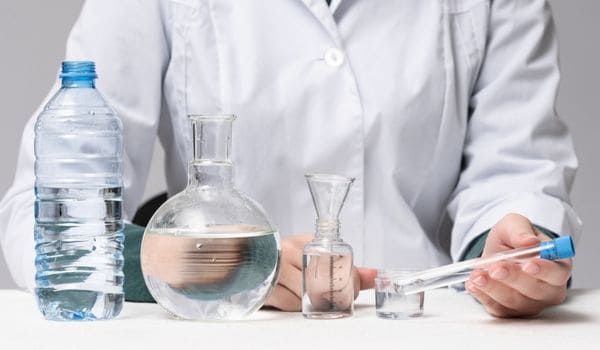🥴 Something Smells Off…
If your tap water smells like rotten eggs, you’re not imagining it. That sulfur stench usually points to hydrogen sulfide gas — a byproduct of bacteria in your well, water heater, or plumbing. It can also come from naturally occurring sulfur in groundwater or a buildup inside your softener tank.
Whatever the cause, that odor can turn drinking, bathing, or even brushing your teeth into a pretty unpleasant experience.
The good news? It’s almost always fixable — once you pinpoint where it’s coming from.
Let’s walk through what causes that eggy funk, when it might be a red flag for contamination, and the best ways to kick the stink for good.
✅ Quick Takeaways
- 🧪 Hydrogen sulfide gas is the #1 cause of that rotten egg smell — it often forms in well water or old plumbing.
- 🔥 If the odor’s only in hot water, your water heater might be to blame.
- 🧫 Sulfur and iron bacteria aren’t harmful themselves, but their presence often hints that your water might be vulnerable to other contaminants — like coliform.
- 🚿 Some odors come from harmless minerals, but others might point to septic leaks or poor well conditions — testing is key.
- 🧰 The right filter can fix it — but you’ll need to know exactly what’s causing the stink to choose the best one.
🦨 What’s Causing the Rotten Egg Smell?

That funky, sulfur-like smell usually comes from hydrogen sulfide gas — a naturally occurring compound that can sneak into your water from a few sources.
Here’s how it can end up in your tap:
- 🧪 Natural sulfur reactions: In well water, hydrogen sulfide can form when sulfur interacts with decaying organic material underground.
- 🦠 Sulfate-reducing bacteria: These microbes feed on sulfur and leave behind hydrogen sulfide gas as a byproduct.
- ♨️ Water heater issues: If the smell only shows up in hot water, bacteria in your water heater may be reacting with the magnesium anode rod.
Other culprits that can mimic or intensify that smell include:
- 🍊 Iron bacteria: They thrive in iron-rich water and leave behind a rusty orange slime — plus a smell that’s oddly similar to rotten eggs.
- ⚫ Manganese: This mineral is common in well systems and sometimes creates dark stains and off odors when it builds up.
- 🍂 Tannins: Found in swampy or boggy areas, tannins can give water an earthy or musty odor — and occasionally a sulfur-like one too.
- 🚽 Sewage leaks: Rare, but serious. If you suspect a septic issue (especially with standing water near your drain field), call a pro ASAP.
💡 Pro Tip: Rotten egg smells in hot water but not cold? Your water heater’s anode rod is probably to blame. If it’s both, the issue likely starts at the source.gens in water.
Even though that rotten egg smell is unpleasant, it’s more than just a nuisance. It can signal a range of issues — from harmless bacteria to deeper well contamination. Here’s a quick cheat sheet to help you spot what’s really going on 👇
| 🚩 Possible Cause | 💡 What You’ll Notice |
|---|---|
| 🧪 Hydrogen Sulfide Gas | Strong sulfur smell, especially in well water. May leave black stains on silverware or fixtures. |
| 🦠 Sulfate-Reducing Bacteria | Rotten egg odor in both hot and cold water. More common in wells and heaters. |
| ♨️ Water Heater Reaction | Odor only in hot water. Caused by bacteria reacting with magnesium anode rod. |
| 🍊 Iron Bacteria | Musty odor and orange-brown slime in toilet tanks or bowls. |
| ⚫ Manganese | Dark stains and occasional sulfur-like odor. Often found with iron. |
| 🍂 Tannins | Peaty, musty, or swampy smell — sometimes mixed with sulfur. Turns water yellow. |
| 🚽 Sewage Leak | Foul smell outdoors, slow drains, or standing water. Needs immediate inspection. |
🥴 Is Smelly Water Safe to Drink?

If your water smells like rotten eggs, you probably don’t want to drink it — and honestly, we don’t blame you. But here’s the good news: in most cases, that smell comes from hydrogen sulfide gas, which usually isn’t harmful in small amounts.
Still, there are a few things worth knowing:
- 💨 Sulfur gas is mostly a nuisance, not a danger — but in high enough concentrations, it can irritate your eyes and nose.
- 🚽 It can act like a laxative, especially for kids or anyone with a sensitive stomach.
- 🧫 And while iron and sulfur bacteria aren’t toxic, they thrive in environments that also invite harmful pathogens — like coliform or E. coli.
💡 Pro Tip: If your water is untreated well water and smells strongly of sulfur, it’s smart to do a full panel test to check for bacteria or other contaminants. You can use this comprehensive well water test kit to rule out anything more serious.
☣️ Is Hydrogen Sulfide Dangerous?
In everyday levels found in private wells or plumbing systems, hydrogen sulfide gas is more annoying than dangerous. But it’s still worth understanding the risks — especially if the smell is strong or persistent.
- 🧠 Mild exposure can cause headaches, nausea, and dizziness — though that’s more likely in enclosed spaces like a well pit or basement.
- 🔥 It’s flammable, so in rare cases where gas accumulates (again, mostly in confined areas), there could be a risk of ignition.
- 👃 At very high concentrations, hydrogen sulfide can be toxic — but this is extremely rare in residential water supplies.
That said, if the smell is overwhelming or your water system is in a poorly ventilated area, it’s best to call in a well pro with the right safety gear.
💡 Pro Tip: If you’re noticing strong sulfur smells near your water tank or well cap, stay cautious — don’t enter enclosed well spaces without professional help.
🛠️ How To Get Rid of the Rotten Egg Smell

Before you can fix smelly water, you need to figure out where the odor is coming from. Here’s how to troubleshoot it:
🔥 If the smell is only in your hot water
The culprit is probably your water heater. Sulfur-loving bacteria react with the magnesium anode rod inside the tank, creating hydrogen sulfide gas.
Fix it by:
- Replacing the anode rod with a powered version that doesn’t feed bacteria.
- Flushing and sanitizing your tank (some use hydrogen peroxide or chlorine).
⚠️ Be aware: removing the rod entirely eliminates corrosion protection — not ideal long-term.
💧 If the smell is in both hot and cold water
Now you’re dealing with sulfur somewhere in your water supply — whether from naturally occurring hydrogen sulfide gas or bacteria in the system. In that case, the best next step is a proper water test.
Short-term fix: A shock chlorination can wipe out bacteria (but check your water softener manual — chlorine can damage the resin inside).
Long-term fix: A targeted filtration system is the most reliable way to solve the problem for good.
💡 Pro Tip: Some contaminants like iron or manganese can hide alongside sulfur. A single filter might not be enough — testing helps you choose the right solution the first time.
🔍 What Test Should You Use?

If your water smells like rotten eggs, testing is the only way to know what’s actually causing it — whether it’s sulfur gas, bacteria, or something else hiding in your well.
Here’s what to consider:
🧪 DIY Kits vs Lab Tests
You can buy basic test strips for hydrogen sulfide, iron, or pH — but they only scratch the surface. For deeper insights, lab testing is the way to go.
| 🧰 Test Type | 💡 What It Tells You |
|---|---|
| 🧪 DIY Strips | Quick results, but not very precise or comprehensive |
| 🧬 Lab Testing | Accurate breakdown of contaminants like sulfur, iron, manganese, tannins, and more |
| 📦 Mail-In Kits | Easy to use, and often offer full reports with treatment suggestions |
💡 Pro Tip: A full-panel test like the Essential Well Water Test gives you a clear snapshot of your system — including bacteria, metals, and smelly sulfur compounds — so you know exactly what you’re dealing with before investing in filters.
💧Which Water Filters Work Best?

If your water reeks like sulfur, the fix depends on what’s causing it. That’s why testing matters — once you know the culprit, you can match it with the right filter.
Let’s break it down:
| 🔍 Filter Type | 💡 What It Removes | ✅ Best Use Case |
|---|---|---|
| 🌬️ Air Oxidation | Hydrogen sulfide, iron, manganese (chemical-free) | Ideal for households avoiding chlorine, with moderate sulfur levels — see our sulfur system guide |
| 🧪 Chemical Oxidation | Hydrogen sulfide plus sulfur and iron bacteria | Best for treating microbial contamination and high iron levels |
| 🌱 Catalytic Carbon | Oxidizes and filters hydrogen sulfide (needs oxygen in water) | Good for homes with mild to moderate odors |
| 🧊 Activated Carbon | Low levels of sulfur, tannins, chlorine | Budget-friendly option for mild smells or under-sink use |
| 🔄 Ion Exchange (Special Resin) | Some sulfur, iron, tannins, and hardness | Useful when paired with softeners that use upgraded resin |
💡 Pro Tip: If you’re dealing with multiple contaminants (like sulfur and iron), a hybrid setup — such as a sulfur-specific filter paired with a backwashing whole-house unit — might be your best bet.
🧼 Can Water Softeners Make It Worse?

They can — but it’s not the softener’s fault exactly.
If your system uses a standard resin tank, sulfur bacteria can colonize it just like a water heater. The smell shows up after installation, which throws many people off. But here’s the catch: cleaning these systems isn’t always straightforward.
- 🧪 Chlorine shock treatments may work in some water heaters, but they can damage softener resin if you’re not careful.
- 📘 Check your manual before adding any disinfectants — some resins can tolerate low chlorine levels, but many can’t.
- 🔄 If the resin is already fouled, it may need to be replaced entirely — but sanitizing the tank and installing a pre-filter can help prevent the issue from coming back.
💡 Pro Tip: If you’re planning to install a softener and your water already has that sulfur smell, filtering first is your best move. It protects your softener and tackles the root cause in one step.
✅ Final Thoughts
That rotten egg smell isn’t just unpleasant — it’s a sign that something’s off in your water. Whether it’s sulfur gas, iron bacteria, or decaying organics, one thing is clear: ignoring it won’t make it go away.
The good news? Once you know what’s causing the odor, you can tackle it head-on. A simple water test can point you to the right fix — whether that’s tweaking your water heater or installing a filter designed for the job.
💡 Pro Tip: If your water smells bad, it may also be harboring other unseen contaminants. Solving the smell often means improving your overall water quality.
Clean water shouldn’t come with a side of stink. Now you’ve got the tools to fix it.
 154 people found this helpful. Was this guide helpful to you?
154 people found this helpful. Was this guide helpful to you? 

